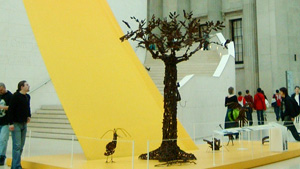
|
ACTS OF PETTY DESTRUCTION PARALLEL ACTS OF SENSELESS AGGRESSION, SHOW NEED TO CARE ABOUT MEANING, OTHERNESS 9 February 2007 We are living with a general malaise on all sides in these times, and we are treating it with too much aplomb and not enough courage. Three nights ago in Barcelona, Spain, one of the great iconic works of the city was attacked by a group of senselessly angry (as if by profession) young people, an entirely destructive and inadequate expression of something that is perhaps more ego-driven than anyone suspects. Neighbors described the suspects as a group of youths with "punk" or "okupa" appearance, indicating a coincidence of alternative dress, intended to indicate edginess, and a squatter lifestyle ('okupa' refers to squatter communities and in Barcelona has become a social movement, but covers the spectrum from those who simply occupy abandoned space irregularly to those who use art and a cooperative lifestyle to remake a disused industrial zone). The neighbors intended to indicate only a cliché of torn clothing, mangled hair, tattooing, piercing, possibly chains and ill-fitting jeans, and a commonly observed need to demand recognition of the freedom of these and only these particular individuals. The characterization has not been proven, nor is the stereotype itself of much importance. What matters is that there are competing interests seeking to establish their own moral superiority while directly suggesting and seeking to prove the imprisonment of the Other, as if some vital spiritual satisfaction lay in that exercise. And why? We must put to ourselves now, as ever, the roaring question of why it is that this competition for the right to freedom and spirit is so heated and reflexive and angry at this moment. Obviously, it is not worse to break the nose of a statue than to murder children in a school, or anywhere for that matter, as seems increasingly frequent in news from around the world, but there is a basic urge to inhumanity that takes part in the designs of any who choose expression of feeling via destruction. In all of this, of the first order of importance is the need to take stock of fact and of fiction, of selfish stupidities and of the meaning of real suffering, and then to realize that there is never a good reason to use violence for self-affirmation. Some would say that when a great wrong is committed, but there the supposedly "good reason" is negated by tits being a "bad" environment (which is only expanded and ingrained by the use of violence to "stamp out" whatever ill is at hand), and the self-affirmation is negated by the horrible lie that is any act of vengeance, which is always really attempted vengeance and a very sad sort of spiritual suicide. We must remember that sacrifice as such is not an inherently good thing, though we are all very fortunate that human beings do often go out of their way or even risk situations, affections and realities they value greatly, for the benefit of others. Acting selflessly is not necessarily the same as sacrifice and vice-versa. We must uproot and disassemble the misconception that in loss, in conflagration, in sacrifice for sacrifice's sake, there is something sacred. It compels the human animal to unnatural acts of brutality and to a zeal to eliminate certain aspects of the human world in supposedly ritual cleansings. For this reason, the very idea that sacrifice (as sacrifice, not as giving) leads to an increase in sanctity poses a great threat to the fabric of any human society, and can be the seed for serious campaigns of violence, as it can for petty disturbances or attempts to destroy a common culture that both illuminates and brings together. To give of oneself is forgiveable, even necessary, and deserves remark and reward; to choose that at a given time or place a specific anything will be sacrificed, be it symbolic, living or simply concrete and aesthetic, is aggression against the fabric of the existing world, a false attempt to reduce one's own obstacles, a violence that only invites the unforgiveable resignation of the masses to the idea that violence and the diminishment of the Other is a useful undertaking. Today, we face a global crisis brought on by the hubris and the tendency to convenient acts of moral resignation, to which human society has so long been accustomed. But the great obstacle to acting to combat accelerated global climate change, is the tendency of human societies to cultivate their own anger, on moral grounds, toward other human beings... seeking a kind of karmic deficit which apparently justifies acting in ways that should invited shame and indignation. The result of hundreds of years of human ingenuity, given the broadest blind faith and personal and social surrender to the perceived rules of progress, have left the global human world between an addiction to incomplete industrial processes and the dangerous results of that lack of follow-through. We are now seeing that the stability of the natural environment is put in jeopardy by the tendency of human societies to seek comfort over syncronicity, quick-fixes over wisdom. It is as much a matter of understanding Otherness to put in the necessary effort to learn to work with and not against nature, as it is to learn to open one's intellect and one's daily sense of identity to the validity of competing points of view, cultures or creeds. And in the slapstick tendency to extract oneself or one's sphere of influence abruptly from such dialogues, to use destruction as a pseudo-language, we find that human civilization plays a childish but very aggressive game with its own future, with the fabric of its own potential for creative collaboration. The thoughtless vandals who for some reason, induced by hardship, alienation, intoxication or just a learned and ingrained indifference to Otherness, demonstrated the problem that emerges at emotional moments in all human environments: what to do to be heard, to be seen, to feel that the voice has some potential for expression? Anger, vengeance, malaise, fear, guilt and boredom, coincide in that they can never motivate authentically useful or beneficial behavior; they can only immerse one in untruth and demand that one negative be piled on top of another, to the benefit of absolutely no one, in the long run. We need to learn to see that human civilization is not just a capricious or whimsical indulgence, not just a project of the intellect because it is worried about stability, and certainly not limited to the basest tendencies of pathologically frightened individuals or communities to use it as an excuse to do harm to rival groups, who supposedly imperil that project. We need to learn that crimes against individuals, against the products of human creativity, against the faint spark of hope in the vast dark of mortal existence, are not part of human nature, not part of civilization, and do not have their rightful place in the petty foibles of lifestyle. They are quite succinctly destruction. And destruction has only one end: destruction. It cannot give, it cannot clean, it cannot improve or benefit, cover-up or get rid of. It cannot combat the negative, because the traces of any negative are only reinforced and justified by the application of destruction as a solution. [s]
RELATED STORIES & ANALYSES: The peace agreement signed between the main rebel faction in Darfur and the Khartoum government last May was tenuous at best from the outset, and seems in serious jeopardy of failing. The desperate situation in Darfur is now deteriorating, as violence against civilians not only continues but appears to be escalating, and foreign forces remain ineffectual. [Full Story]
GENERALS, REPUBLICANS REVOLT AGAINST BUSH TORTURE POLICY Roughly three dozen retired generals, including former Sec. of State and Chairman of the Joint Chiefs of Staff, Colin Powell, have come out in opposition to the White House's latest attempt to transform the legal meaning of the Geneva Conventions ban on torture and inhumane treatment of prisoners. Senate leaders, behind John McCain (R-AZ) have also joined the rebellion, passing a measure that upholds the standing definition of the Geneva constraints on coercive interrogation. [Full Story] BUSH ADMITS TO SECRET JAILS WITH 'ALTERNATIVE' INTERROGATIONS Pres. Bush has acknowledged the existence of a secret network of CIA-run prisons, where an "alternative set of procedures" was used to extract information given up "unwillingly" by top terror suspects. The revelation suggests that some facilities existed on European soil, renewing allegations that have long been denied by European and US officials, and provoking calls for a probe into possible human rights violations. [Full Story] 'TREE OF LIFE' MAKES USED WEAPONS INTO SIGN OF HOPE11 July 2005 In the wake of Mozambique's long civil war, lasting from 1976 to 1992, a group of artists, sponsored by Christian aid, set up the Transforming Arms into Tools (TAE) project in the nation's capital, Maputo. Sculptors use decomissioned weapons, and parts of weapons to make art, expressing the possibility of finding new ways to secure and advance civil society. [Full Story] |
||||||||||||||||||||||||||||||||
|
|||||||||||||||||||||||||||||||||




